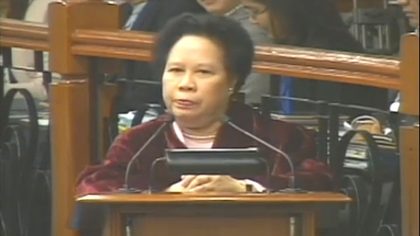SUMMARY
This is AI generated summarization, which may have errors. For context, always refer to the full article.

MANILA, Philippines – The resumption of the Corona trial on Tuesday, January 24, showed an impeachment court that has no fixed rules even on issues as basic as the listing of witnesses and documents.
Senate President Juan Ponce Enrile, the court’s presiding officer, adjourned the trial after only one-and-a-half hours, following debates on what rules the court should apply in the course of the proceedings.
Not a single witness or document was presented.
In the first few minutes of the trial, Sen. Miriam Defensor-Santiago asked both parties a fundamental question: How many witnesses do they have in the duration of the trial? How many documents do they intend to present?
The prosecution offered no specific answers and begged for time to make its own list. The defense said they intend to present 15 witnesses and no less than 25 documents.
Santiago proceeded to ask another question: What type of evidence should be presented in court before a judgment has to be made by the Senate?
Chief prosecutor Rep. Niel Tupas said only “substantial evidence.” Lead defense counsel Serafin Cuevas disagreed, insisting it should be “proof beyond reasonable doubt.”
Because of the extreme positions of both sides, Santiago recommended that senators hold a caucus to decide on it. None objected.
More evidence
Tuesday’s trial was meant to present prosecution witnesses who could attest to the properties and income earned by Chief Justice Renato Corona since he joined the Supreme Court in 2002.
But on Tuesday morning, the defense filed an urgent memorandum asking the Senate to stop the prosecution from presenting further evidence in relation to their allegations of graft and corruption and ill-gotten wealth against Corona.
Santiago, who was also part of the impeachment court that tried former President Joseph Estrada in 2000, offered a compromise: since the defense was given due notice about the plan of the prosecution to present Internal Revenue chief Kim Henares, then she should be allowed to take the witness stand.
In the face of doubt, Santiago advised, evidence should be accepted by the court. “The more evidence we admit, the more the people will believe we are fair,” she said. Otherwise, “sasabihin [ng tao], anong tinatago ninyo?”
She recalled an instance when majority of the senators ruled against the opening of the second envelope in the Estrada impeachment trial in January 2011. Santiago recalled voting with the majority at the time, invoking the rules of court.
But the public suspected that the senators were trying to hide evidence that could pin down Estrada, Santiago noted. This triggered a prosecution walkout and a people power revolt that eventually ousted Estrada.
Tupas’ objection
Enrile did not object to any of Santiago’s points, but Tupas then raised his hand to make a point.
The chief prosecutor noted that the Senate was acting like an ordinary court, claiming that the proceedings the past week have been conducted like a criminal trial.
Addressing Enrile, he asked that the impeachment court be “liberal” in its rules, a plea that apparently did not sit well with the presiding officer.
How liberal did the prosecution want the court to be, Enrile asked. Enrile also reminded Tupas that the prosecution was given enough time to prepare for the trial. Tupas eventually backed down.
Sen. Alan Peter Cayetano stood up to share his thoughts on the nature of the trial. In the end, he asked in Filipino: “What are we proposing as a rule?”
Senators Manuel Villar and Francis Pangilinan joined the discussions, but after a few minutes, Enrile adjourned the trial.
On Wednesday, January 25, the prosecution is expected to respond to the defense panel’s motion for the Senate to stop the presentation of evidence on Article 2 in relation to allegations that Corona has illegally acquired his wealth.
Such pieces of evidence — Corona’s properties and income — are irrelevant to the main point of Article 2 of the Articles of Impeachment, which is the failure of Corona to disclose his Statement of Assets, Liabilities and Net Worth, the defense added.
The prosecution argued both are related.
Trial resumes on Wednesday at 2 pm – Rappler.com
Add a comment
How does this make you feel?
There are no comments yet. Add your comment to start the conversation.